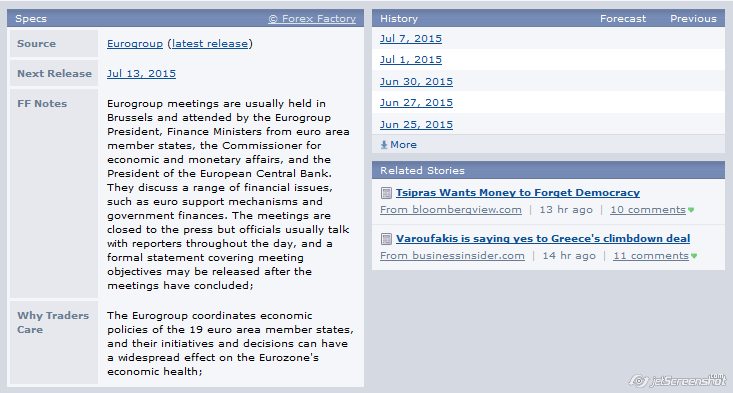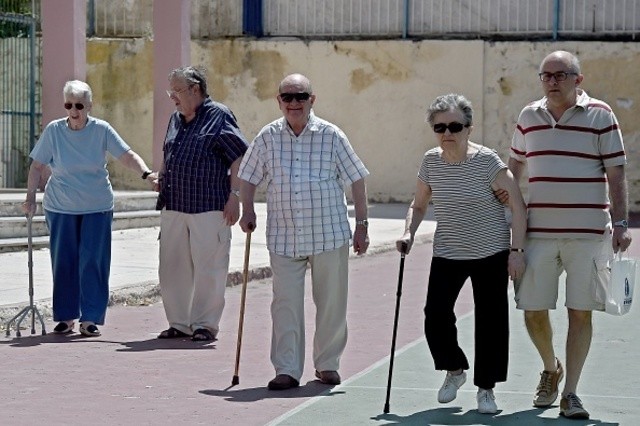


Tsipras Wants Money to Forget Democracy
https://www.mql5.com/en/signals/111434
Greek Prime Minister Alexis Tsipras's favorite Twitter hashtag is democracy. On July 6, after his side won a referendum to reject creditors' terms for a continued bailout, he tweeted that #democracy had triumphed. Yet Thursday night, his government proposed a new term sheet that looks to be spit in the face of every Greek who voted "No" -- 61.31 percent of those who came to the polls. The reason: Tsipras thinks he can get more money now than he could have before the vote.
Here are all the differences in specific parameters that I've managed to find between the creditors' proposal rejected by the Greek voters and the new document from the Greek government:
- Primary fiscal surplus: No difference whatsoever: The targets remain 1 percent of gross domestic product in 2015, 2 percent in 2016, 3 percent in 2017 and 3.5 percent thereafter.
- Value-added tax reform: The new government proposal insists on a 13 percent VAT on hotels, while the creditors wanted to raise it to 23 percent. (The new document omits to mention a specific revenue-increase target for 2015, which the creditors wanted to set at 1 percent GDP.)
- Pension reform: The exact language of the creditors' proposal has been cut and pasted into the new document.
- Public financial management: The government proposal calls for the same measures as the creditors' proposal did -- including a new criminal law on tax evasion, tighter health-care spending controls, welfare system reform to generate annual savings of 0.5 percent of gross domestic product, an increase in corporate tax from 26 percent to 28 percent, a new tax on TV advertising, more luxury and property taxes, and the elimination of fuel subsidies for farmers. The only difference is that the government wants a smaller cut in defense spending -- 100 million euros this year rather than 400 million, as the creditors suggested.
- Labor market: No difference. The Greek government undertakes to bring its labor market arrangements into line with European Union best practice.
- Product markets: No difference. The same measures to cut red tape, remove restrictions and boost competitiveness are outlined in the same language.
- Privatization: The government doesn't commit to any specific revenue targets like those specified in the creditors' proposal. It merely promises to complete the sell-off processes begun by its predecessors, something the creditors also called for.
In effect, then, it appears that Greeks voted on Sunday to achieve just three things: 1) a lower VAT rate for hotels; 2) an extra 300 million euros in military spending; 3) no privatization revenue targets.
If Tsipras had formulated the referendum question that way, I doubt many voters would have turned out.
Philosopher Slavoj Zizek recently explained the Greek problem in terms of a clash between democracy and Europe's technocratic approach: "Strategic decisions based on power are more and more masked as administrative regulations based on neutral expert knowledge, and they are more and more negotiated in secrecy and enforced without democratic consultation." Tsipras's party, Syriza, in Zizek's view, is a disruptive democratic force meant to bring Europe back to its true values. He says:
Only a new “heresy” (represented at this moment by Syriza) can save what is worth saving in European legacy: democracy, trust in people, egalitarian solidarity. The Europe that will win if Syriza is outmanoeuvred is a “Europe with Asian values” (which, of course, has nothing to do with Asia, but all with the clear and present tendency of contemporary capitalism to suspend democracy).
Tsipras's new proposal is in line with one democratic tradition. Aristophanes' "The Knights," written in the 5th century B.C., has a character named Demos, "a sour old man, quick-tempered, country-minded, bean-consuming, a trifle hard of hearing." (Some English translators have rendered the Greek name as Mr. People.) Demosthenes, his slave, thus describes a freshly purchased newcomer to the household, a certain tanner:
He soon finds out
Master's weak points; and cringing down before him
Flatters, and fawns, and wheedles, and cajoles,
With little apish leather-snippings, thus:
O Demos, try one case, get the three-obol,
Then take your bath, gorge, guzzle, eat your fill.
Would you I set your supper? Then he'll seize
A dish some other servant has prepared,
And serve it up for master.
This is more or less what happened to the Greek voters in the past two weeks, except for the guzzling. They -- especially the poorest, who backed Tsipras in the referendum -- have been cheated by the government that they elected to fight austerity and serve as Zizek's progressive heretics on the European stage. Unless die-hard radicals in the Greek parliament today vote down the Tsipras proposal, the government will do exactly the opposite of what the people voted for: enact more austerity measures and give in to Europe's technocratic establishment.
It won't be for nothing, however. Two weeks ago, the creditors were offering Greece only an extension of the existing bailout program, in which just 7.2 billion euros remained. Now, Tsipras is agreeing to the same requirements in exchange for a three-year, 53.5 billion euro bailout. What's more, he wants to talk debt reduction, and has reason to believe he can, because the International Monetary Fund, the U.S. and some top European officials, including European Council President Donald Tusk, have voiced support for more "debt sustainability."
Tsipras has cunningly presented a gift to those who are afraid to take responsibility for letting Greece drop out of the euro. OK, so a hefty bill comes with the gift -- but it looks as if the Greeks have caved! French President Francois Hollande has already called the Greek proposal "serious, credible" and indicative of Greece's determination to remain in the euro zone.
Pay us more and we'll forget all about democracy is the offer now on the table. If German Chancellor Angela Merkel and her ruling coalition accept this, as Hollande seemingly already has, Greece will remain on European life support. And then Tsipras will see about those reforms.

Varoufakis is saying yes to Greece's climbdown deal
https://www.mql5.com/en/signals/113999
Greece's celebrity ex-finance minister Yanis Varoufakis is backing the government's new bailout deal, according to two tweets on Friday.
Jean Quatremer, Brussels correspondent for French newspaper La Liberation, had earlier suggested that Varoufakis might not support the government position.
On Friday afternoon Quatremer tweeted that Varoufakis had called on Syriza to reject his former boss, Prime Minister Alexis Tsipras' proposals at an internal party meeting.
Varoufakis was widely viewed as an impediment to the negotiations, and some participants complained about his conduct at the talks. German finance minister Wolfgang Schaeuble said that his replacement, Oxford-educated economist Euclid Tsakalotos, was more "conventional".
Despite backing the deal, Varoufakis tweeted that he won't be there to vote for it, due to family commitments.
The deal now suggested contains most of what EU Commission chief Jean-Claude Juncker proposed at the end of June, including painful reforms to the pension system, in exchange for three years of bailout financing. It looks like it'll go ahead despite the July 5 referendum in which Greek voters overwhelmingly rejected a very similar deal.
Despite the reported opposition, Reuters suggests only three Syriza members of parliament are openly opposed to the agreement that's been tabled by Tsakalotos.
Here's the statement they issued on Friday:
The government even at this hour can and should respond to the institutions' blackmail with the dilemma: either a programme without new austerity, with funding and a debt write-off or an exit from the euro and suspension of payments of the unjust and non viable debt.
There will undoubtedly be some opposition from within the government, but it seems that the majority of Syriza will not be opposing Tsipras move. According to Paul Mason, the international journalist with the best links to the party's left, there's unlikely to be any big rebellion even from the hardliners.
The deal's not done yet — but if it's acceptable to Europe and internal opposition has suddenly become muted, it finally looks like it may happen.
Read more: https://www.mql5.com/en/signals/111330


